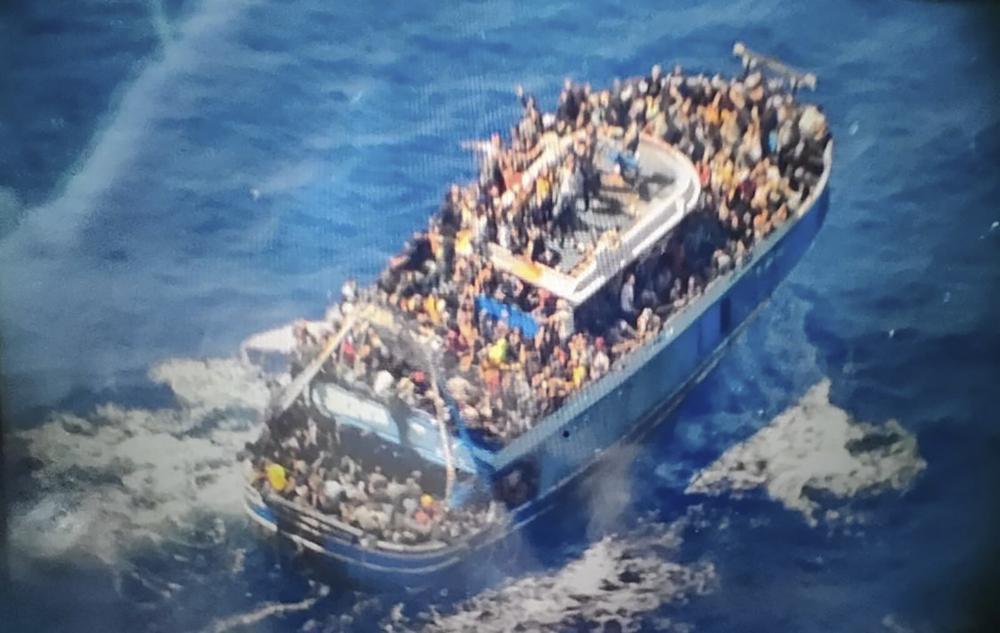Greece seeks survivors in 'horrific' migrant boat sinking
ATHENS

Greece on Thursday pursued a grim search for survivors a day after a fishing boat overloaded with migrants capsized and sank in the Ionian Sea, with the number of victims feared to reach into the hundreds.
As relatives in the migrants' home countries frantically sought details of their loved ones, the coastguard said 78 bodies had been recovered so far.
"This could be the worst maritime tragedy in Greece in recent years," Stella Nanou of the UNHCR refugee agency told state broadcaster ERT.
"It's really horrific," UNHCR staffer Erasmia Roumana told AFP at the port of Kalamata, adding that the survivors were "in a very bad psychological situation".
"Many are under shock, they are so overwhelmed," she said. "Many of them worry about the people they travelled with, families or friends. They want to call their families and tell them that they arrived."
A coastguard spokeswoman told AFP that two patrol boats, a helicopter and six other ships in the area were searching the waters west of the Peloponnese peninsula, one of the deepest parts of the Mediterranean.
Greece has declared three days of mourning over the tragedy and a senior prosecutor has been assigned to investigate.
"One young man started to cry and said, I need my mother... This voice is inside my ears. And will always be inside," Red Cross nurse Ekaterini Tsata told AFP.
Around 30 people were hospitalised with pneumonia, dehydration and exhaustion but are not in immediate danger, officials said.
So far 104 people have been rescued but there are fears that hundreds more are missing, based on testimony from the survivors and the fact that no women and children were among them so far.
A survivor told hospital doctors in Kalamata that he had seen a hundred children in the boat's hold, ERT said.
"The fishing boat was 25-30 metres long. Its deck was full of people, and we assume the interior was just as full," coastguard spokesman Nikolaos Alexiou told ERT.
Government spokesman Ilias Siakantaris on Wednesday said there were unconfirmed reports that up to 750 people were on the boat.
"We do not know what was in the hold... but we know that several smugglers lock people up to maintain control," he told ERT.
The coastguard said a surveillance plane with Europe's Frontex agency had spotted the boat on Tuesday afternoon, but the passengers had "refused any help".
The boat's engine gave up shortly before 2300 GMT on Tuesday and the vessel later capsized, Siakantaris said, sinking in around 10 to 15 minutes.
The coastguard added that none on board were wearing life jackets.
Alexiou, the coastguard spokesman, suggested that the boat might also have capsized if the coastguard had attempted to stop it by force.
"You cannot divert a boat with so many people on board by force unless there is cooperation," he said, adding that it was "fortunate" that rescue ships were nearby or more lives would have been lost.
Authorities said it appeared the migrants had departed from Libya and were heading for Italy.
The survivors are mainly from Syria, Egypt and Pakistan, the coastguard said, and are temporarily housed in a port warehouse to be interviewed by Greek authorities, who are looking for possible smugglers among them.
Greece is under an interim government until June 25 national elections.
Acting migration minister Daniel Esdras told ERT that the survivors would be taken to a migrant camp near Athens.
"We hope to transfer them this afternoon or tomorrow morning at the latest," he said.
He added that Greece would examine their asylum claims, but that those not entitled to protection would be sent home.
Along with Italy and Spain, Greece has been one of the main landing points for tens of thousands of people seeking to reach Europe from Africa and the Middle East.
The worst migrant tragedy in Greece was in June 2016, when at least 320 people were listed as dead or missing in a sinking near Crete, according to AFP records going back to 1993.
The Mediterranean's worst disaster overall was in April 2015, when 800 to 900 migrants died on a trawler that sank within sight of a Portuguese rescue freighter.
















